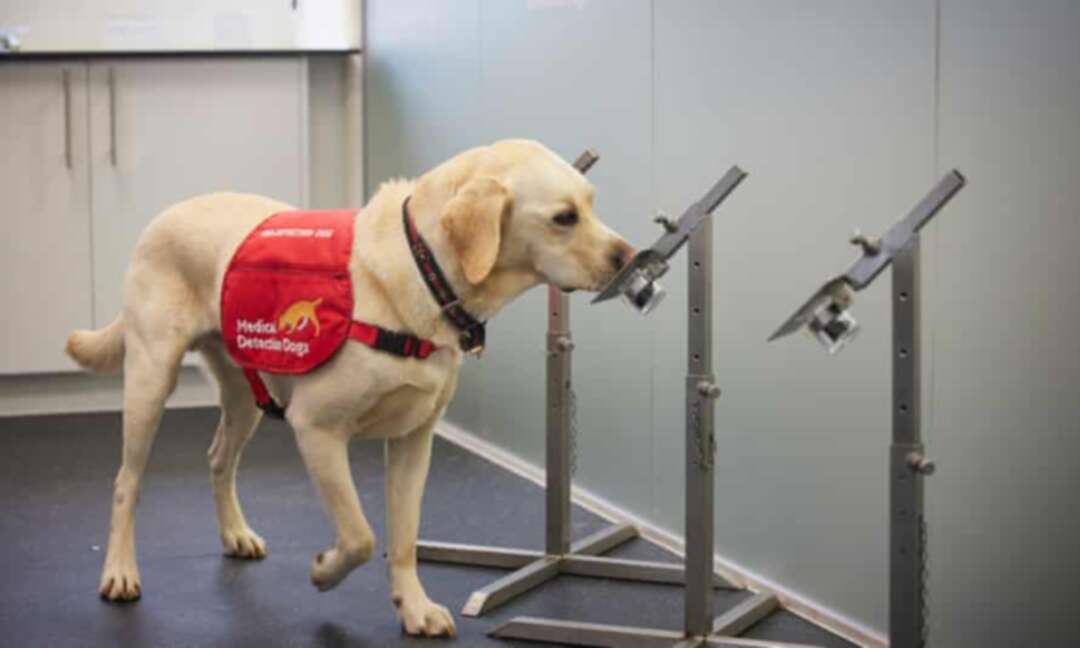-
Dogs detect coronavirus immediately and accurately

Tala, 3, a medical detection dog, during training to detect the presence of Covid-19 in samples of socks worn for 12 hours by volunteers across the UK. Photograph: David Levene/The Guardian
Linda Geddes
Faster than PCR and more accurate than lateral flow tests, the latest weapons against Covid-19 have four legs and a wet nose.
A study published on Monday found that people who are infected with coronavirus give off a distinct odour, which these highly trained dogs can detect with pinpoint precision.
Tala, a golden labrador in a red work jacket, greets me with a cursory sniff, before returning to his handler. I’m relieved to have passed the test, but feel a wet train of mucus on my hand where I petted him. This mucus fulfils an important purpose: dissolving odour molecules from the air and transporting them to olfactory receptors in the top of their nose, where the magic happens. Whereas humans have about 5m of these receptors, dogs have up to 300m.
Dr Claire Guest has always been fascinated by dogs, and humans’ relationship with them. After studying psychology, she worked for Hearing Dogs for Deaf People, where she met a woman who said her pet dalmatian had diagnosed a malignant melanoma on her calf. “She kept saying, ‘The dog sniffed it,’” Guest recalled. In 2002, Guest joined forces with an orthopaedic surgeon, John Church, to test whether dogs could be trained to distinguish between urine from healthy people and those with bladder cancer. The research, published in the BMJ, showed that they could.
Medical Detection Dogs was formed in 2008. The charity trains companion dogs that can detect odour changes in people with type 1 diabetes and other severe disorders, emitted shortly before their health deteriorates, alerting them to take action. It also researches dogs’ abilities to detect cancers, and other diseases, including Parkinson’s. When the pandemic hit it had just completed a study with the London School of Hygiene & Tropical Medicine (LSHTM), demonstrating that dogs can detect malaria.
Tala is one of six dogs who took part in the Covid study, which has not yet been peer-reviewed. It found that dogs could detect Covid-19 on clothing worn by infected people with up to 94.3% sensitivity: they would correctly identify 94 out of every 100 infected people. This compares with a sensitivity of 58-77% for lateral flow tests, and 97.2% for PCR tests.
However, dogs beat PCR tests on speed, making a diagnosis in under a second. “This includes people who are asymptomatic and also people with a low viral load,” said Prof James Logan of LSHTM, who co-led the study.
Tala was the most accurate sniffer, achieving 94.5% sensitivity, and a specificity of 92% – the proportion of uninfected people that he would correctly identify.
I watch as Tala’s trainer, Mark Somerville, guides him towards three low stands, each holding a fragment of blue nylon sock beneath a metal grille. The labrador’s assessment is over in seconds: he walks calmly up to each stand, swiftly passing his nose over the grilles, before pausing at the second and furiously wagging his tail – Tala’s way of communicating that he has identified the target scent.
Each dog has a different “tell”. Millie, a fox red golden retriever, sits and utters a whining sound when she detects the target sock. Other dogs stand stock-still.
Tala is one of Guest’s dogs, and the great nephew of Daisy, a detection dog pioneer who was involved in the original bladder cancer study – and subsequently diagnosed an early-stage tumour in Guest’s breast. “She just kept staring at me and nudging,” Guest said.
Some of the dogs were born into this occupation, others are rescue dogs that have been donated. Asher, a cocker spaniel who also lives with Guest, was too active for his previous family but is now a valued member of the Covid-detection squad.
Gundog breeds such as spaniels, retrievers and labradors make particularly good detection dogs. “These are dogs that absolutely just love searching,” said Guest. “They’re also very friendly and they enjoy working in public places.”
It takes eight to 10 weeks to train a Covid-19 detection dog. They are rewarded with an edible treat or ball for correctly indicating a positive sample or correctly ignoring a negative one. For the Covid study, the dogs were trained using T-shirts, socks and masks donated by members of the public and NHS staff, some of whom had tested positive for Covid.
Accurate as they are, dogs will never replace PCR tests. While they might be useful at airports, where they could rapidly screen disembarking passengers, those identified would require a confirmatory PCR test, and to quarantine while awaiting the results – but this would inconvenience far fewer people than requiring everyone to quarantine and undergo PCR tests.
The biggest challenge is scaling up: training takes time, and requires clothing worn by infected and uninfected individuals. Work is under way to identify which odour molecules the dogs are detecting; this could enable a “pseudo-odour” to be manufactured, increasing the number of dogs that could be trained.
So will you see Covid sniffer dogs at airports in the near future? Given that similar projects are under way in countries including Finland, France and Lebanon, it seems entirely paw-sible.
The Guardian, 24 May 2021 06.00 BST
Tags
You May Also Like
Popular Posts
Caricature
BENEFIT AGM approves 10%...
- March 27, 2025
BENEFIT, the Kingdom’s innovator and leading company in Fintech and electronic financial transactions service, held its Annual General Meeting (AGM) at the company’s headquarters in the Seef District.
During the meeting, shareholders approved all items listed on the agenda, including the ratification of the minutes of the previous AGM held on 26 March 2024. The session reviewed and approved the Board’s Annual Report on the company’s activities and financial performance for the fiscal year ended 31 December 2024, and the shareholders expressed their satisfaction with the company’s operational and financial results during the reporting period.
The meeting also reviewed the Independent External Auditor’s Report on the company’s consolidated financial statements for the year ended 31 December 2024. Subsequently, the shareholders approved the audited financial statements for the fiscal year. Based on the Board’s recommendation, the shareholders approved the distribution of a cash dividend equivalent to 10% of the paid-up share capital.
Furthermore, the shareholders endorsed the allocation of a total amount of BD 172,500 as remuneration to the members of the Board for the year ended 31 December 2024, subject to prior clearance by related authorities.
The extension of the current composition of the Board was approved, which includes ten members and one CBB observer, for a further six-month term, expiring in September 2025, pending no objection from the CBB.
The meeting reviewed and approved the Corporate Governance Report for 2024, which affirmed the company’s full compliance with the corporate governance directives issued by the CBB and other applicable regulatory frameworks. The AGM absolved the Board Members of liability for any of their actions during the year ending on 31st December 2024, in accordance with the Commercial Companies Law.
In alignment with regulatory requirements, the session approved the reappointment of Ernst & Young (EY) as the company’s External Auditors for the fiscal year 2025, covering both the parent company and its subsidiaries—Sinnad and Bahrain FinTech Bay. The Board was authorised to determine the external auditors’ professional fees, subject to approval from the CBB, and the meeting concluded with a discussion of any additional issues as per Article (207) of the Commercial Companies Law.
Speaking on the company’s performance, Mr. Mohamed Al Bastaki, Chairman BENEFIT , stated: “In terms of the financial results for 2024, I am pleased to say that the year gone by has also been proved to be a success in delivering tangible results. Growth rate for 2024 was 19 per cent. Revenue for the year was BD 17 M (US$ 45.3 Million) and net profit was 2 Million ($ 5.3 Million).
Mr. Al Bastaki also announced that the Board had formally adopted a new three-year strategic roadmap to commence in 2025. The strategy encompasses a phased international expansion, optimisation of internal operations, enhanced revenue diversification, long-term sustainability initiatives, and the advancement of innovation and digital transformation initiatives across all service lines.
“I extend my sincere appreciation to the CBB for its continued support of BENEFIT and its pivotal role in fostering a stable and progressive regulatory environment for the Kingdom’s banking and financial sector—an environment that has significantly reinforced Bahrain’s standing as a leading financial hub in the region,” said Mr. Al Bastaki. “I would also like to thank our partner banks and valued customers for their trust, and our shareholders for their ongoing encouragement. The achievements of 2024 set a strong precedent, and I am confident they will serve as a foundation for yet another successful and impactful year ahead.”
Chief Executive of BENEFIT; Mr. Abdulwahed AlJanahi commented, “The year 2024 represented another pivotal chapter in BENEFIT ’s evolution. We achieved substantial progress in advancing our digital strategy across multiple sectors, while reinforcing our long-term commitment to the development of Bahrain’s financial services and payments landscape. Throughout the year, we remained firmly aligned with our objective of delivering measurable value to our shareholders, strategic partners, and customers. At the same time, we continued to play an active role in enabling Bahrain’s digital economy by introducing innovative solutions and service enhancements that directly address market needs and future opportunities.”
Mr. AlJanahi affirmed that BENEFIT has successfully developed a robust and well-integrated payment network that connects individuals and businesses across Bahrain, accelerating the adoption of emerging technologies in the banking and financial services sector and reinforcing Bahrain’s position as a growing fintech hub, and added, “Our achievements of the past year reflect a long-term vision to establish a resilient electronic payment infrastructure that supports the Kingdom’s digital economy. Key developments in 2024 included the implementation of central authentication for open banking via BENEFIT Pay”
Mr. AlJanahi concluded by thanking the Board for its strategic direction, the company’s staff for their continued dedication, and the Central Bank of Bahrain, member banks, and shareholders for their valuable partnership and confidence in the company’s long-term vision.
opinion
Report
ads
Newsletter
Subscribe to our mailing list to get the new updates!






















